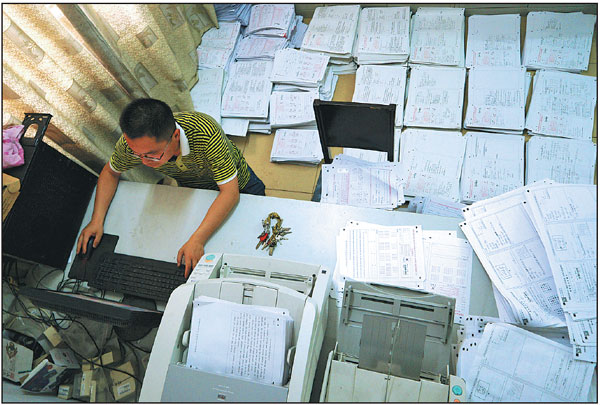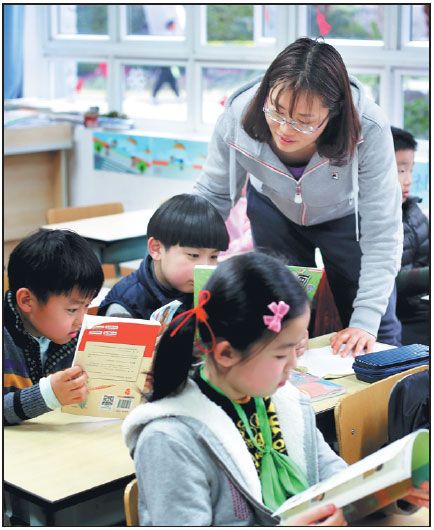Paperwork pushes teachers to breaking point
Administrative duties are taking up an increasing amount of time, to the detriment of both staff members and students. Zou Shuo reports.
Few teachers enter the profession expecting an easy life and to only work from 9 am to 5 pm, but recently workloads, especially endless paperwork that appears to have little to do with teaching, have spiraled out of control.
It's unlikely that anyone would choose a career in teaching because they enjoy filling out forms and dealing with inspections, but now administration has become a large part of the job.
|
Wu Xuechao, an Information Technology teacher in Zhumadian, Henan province, scans test papers after an exam for senior students at his high school in May. Wang Xiangyang / For China Daily |
Maintaining a healthy work-life balance is a major issue for many teachers, who routinely sacrifice lunch breaks, evenings and large parts of their weekends to doing what many deem unnecessary paperwork.
They said time locked in offices filling out forms could be better spent in the classroom or on pursuing professional development, both of which would have greater tangible benefits for their students' education.
The waves of school-based forms from all levels of the education authorities may be well-intentioned, but they are having a negative effect. Teachers are burning out and finding that the joy is fading from their classrooms, actual teaching time is limited and family time is being compromised.
Zhang Hong, who teaches at a primary school in a village in Jiangxi province, said she usually has to work 60 to 80 hours a week, and a big part of the job entails filling out forms.
She believes the amount of paperwork teachers are now expected to deal with is getting out of hand and taking her away from teaching her students.
As the head teacher of her class, she has at least eight notebooks in which she keeps daily updates of different aspects of her work.
They include: one devoted to class routines - such as the number of students attending, the topics they study and feedback - and how the students perform every day; one for school and student safety; one for the progress of the school's digitalization program; one for notes about different meetings; one for her work plans; one for her teaching plans; and one for the school's efforts to develop the students' sporting, musical and artistic talent.
Frequent inspections
Moreover, whenever education authorities at different levels arrive to inspect the school, which happens increasingly frequently, Zhang has to prepare paperwork for the review. Once the inspectors have left, she has to write reports detailing suggestions to further improve management of her class, she said.
Last year, in addition to the handwritten notebooks, the work she completed on her computer amounted to more than 3,000 pages of A4-size paper.
"I believe the need for documentation has lost sight of the original intention, which was to help teachers improve their teaching," she said. "A lot of it seems to be paperwork as proof of having done other paperwork. It comes down to a lack of general trust in teachers' judgment as professionals."
Yu Dangchu, who teaches Chinese at a middle school in Shanghai, said that in addition to paperwork, teachers have to deal with a rising number of requests from parents, especially with the growing prevalence of teacher-parent groups on WeChat.
"Parents know they can get through to teachers in the groups whenever they want, and they do so whenever they feel like it, giving teachers all kinds of 'friendly suggestions' on how to do their job better," he said.
A teacher may be criticized if he or she is slightly tardy in replying to the messages, and some parents may even consider them irresponsible and incompetent, according to Yu.
"I do think communication can help solve some issues between parents and teachers, but excessive communication leads nowhere and will only make everyone exhausted," he said.
"Parents need to understand that teachers are professionals, which means they know what they are doing and do not need to be judged by parents who know little about teaching."
Pointless evaluations
Cui Shifeng, principal of Hefei Hupo Mingcheng Primary School in Anhui province, said that while the education authorities have called for a reduction of the academic burden on students, teachers' workloads have increased greatly in recent years.
The endless paperwork indicates that authorities have still not found better ways to evaluate teachers, and need the paperwork as a formal way of assessing performance, he said.
Teachers have been singing the paperwork blues for years, but the problem has become unbearable, mostly because both the central and local governments require them to track students' progress and make schools more accountable, Cui said.
In recent decades, schools have become obsessed with accountability, according to Cui.
He added that there is nothing wrong with teachers being held to account, but noted that they always have been held to account because if they're not at the top of their game the students will behave poorly or parents will be knocking down the staffroom door.
Accountability is not the issue, he said. Instead, the problem lies with the education authorities, school leaders and education experts who want to be able to measure education outcomes so they can point the finger or comment about the teachers' work.
This has resulted in teachers filling out endless forms and making endless notes, instead of doing the job they are employed to do - bringing out the best in their students, he added.
"We've replaced the building of good student-teacher relationships with data collection. Data won't help children with low self-esteem feel better about themselves, but a responsible teacher who has the time to build strong relationships with them might," he said.
Easing the burden
The paperwork problem has become so acute that earlier this year the Ministry of Education said that it would adopt policies to free primary and middle school teachers from unnecessary administrative work.
In addition to classroom instruction and research, many teachers spend a lot of time filling out forms, participating in competitions and handling school evaluations, all of which leaves them exhausted, said Chen Baosheng, minister of education, at the 2019 National Education Work Conference in Beijing.
He added that one of the ministry's priorities this year is to reduce the administrative burden and give teachers time to improve their skills.
The ministry will introduce policies to reduce the administrative workloads of primary and middle school teachers, and it will conduct a thorough assessment of the tasks they are required to do. Unnecessary work will be eliminated, according to Chen.
Xiong Bingqi, deputy director of the 21st Century Education Research Institute in Beijing, said teachers should focus on teaching and research, and not spend their time handling inspections, filling out forms or helping schools win useless awards.
Many schools still require their teachers to submit handwritten lesson plans so the school leaders or education authorities can assess them, yet many teachers do not actually follow the plans when they teach and it has become a waste of time, he added.
"We have to distinguish between writing lesson plans and planning learning. Teachers are fed up with pointless work and writing lesson plans that run to many pages. Even if teaching plans are helpful for new teachers, there is no reason why they should not be digital, which would save a lot of time," he said.
Schools should adopt digital management platforms and share basic information across different levels so teachers can avoid repetitive work, he said.
He added that schools should ask teachers to identify the paperwork they consider essential for teaching, the reasons paperwork has been requested, the paperwork that will improve the management of the school, and the paperwork they consider unnecessary and of little benefit to the school or the students.
"The complex demands of teachers' workloads have the potential to negatively affect the quality of teaching and learning. This is a worrying trend for the future of the education system and for the country," he said.
Contact the writer at zoushuo@chinadaily.com.cn
|
A teacher attends to students at an after-school class at a primary school in Shanghai last month. Liu Ying / Xinhua |
(China Daily 04/11/2019 page5)




















